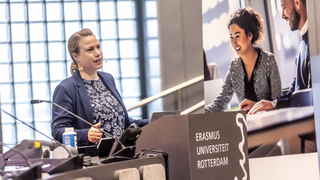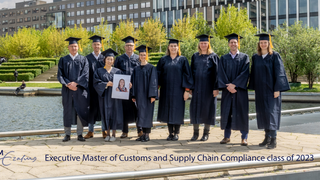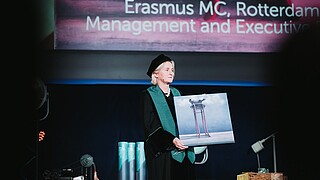It was a welcome return for the annual Summit after an enforced three-year break since the last Summit in 2019. The intervening time has generated huge shifts in ways of doing business and working that have prompted many to reconsider how organisations are led. The speakers gave their own business and personal perspectives and experiences that invited audience members to examine what it is to be a leader, concluding with an inspiring analysis of leading with imperfections from Margriet Vonno. One audience member summed up their experience of the Summit when they said ‘First I have to be a leader for myself, then I can be a leader for other people. If you don’t know yourself, you can’t lead anyone else.’
The power of personal
Jan Christiaan Koenders, Managing Director of Toyota Lexus Netherlands described how the automotive manufacturer has dialled back its use of automation and instead uses human-led manufacturing in key positions and a reliance on managers who trust and respect the human workers in charge of each production step. Toyota’s approach counters the loss of personal contact brought about by the rise of internet retailing and the reliance on data and global supply chains. Its culture is embodied in a statement from Toyota honorary chairman Fujio Cho who said ‘First we build people then we build cars’.
“The power of personal is making sure that you don’t alienate your customer or your employee with artificial intelligence,” said Koenders.
Are you a future leader?
“You’re a leader because others follow you, not because you call yourself a leader,” said Marguerite Soeteman-Reijnen, Chairman of the Executive Board at Aon Holdings. Leadership is tough, she said, and the secret of success is taking the right decisions. How do you get to the right decisions? That’s down to experience. And how do you gain experience? You have to make some wrong decisions. “Failure is part of what we do every day. It’s how we progress and how our people progress with us.”
She invited questions from the audience and spoke about the need for adapting to change. “If you don’t adjust, you don’t challenge, then you don’t grow or succeed. People don’t want to work for a company that doesn’t represent their norms and values,” she said. Her vision of leadership is of helping others to move forward. “Have the courage to use your heart and mind. It’s how to make it work and bring people over to your side.”
Leadership workshops
A festival lunch was followed by breakout sessions and workshops that addressed different aspects of leadership:
- where to get practical help to make positive changes with your business or organisation from Professor Rob van Tulder
- what it feels like to be a changemaker from Eva Rood
- equal opportunities for bringing a real sense of belonging from Prof. Hanneke Takkenberg
- creating sustainable business models for making a profit and generating impact from Prof. Dirk Schoenmaker
- creating a disruptive business model and recruiting the right team members to scale it up from Gijs van Lookeren Campagne and Jan Borghuis
- experimenting with your leadership style to become more flexible and adaptive as a leader from Dr Sofya Isaakyan.
Excelling at being imperfect
Closing speaker Margriet Vonno, Inspector at the Ministry of Foreign Affairs and former Dutch ambassador to Singapore, gave a candid and moving presentation about being imperfect that earned her a standing ovation. She described events in her career and family life that illustrated the interconnectedness of skills and advised that listening carefully and acknowledging the efforts and results of one’s children and one’s colleagues were two of the most effective leadership skills.
She gained the admiration of the audience when she spoke of how her cancer diagnosis, treatment and recovery helped her find her balance. She realised that she could not hide her disease and must act differently to regain balance – just as one of her friends had told her: “Everything we put into the sunlight becomes more manageable.”
Now, rather than persevering, she asks for help, and has seen others have the same experience. “I find it takes more guts to bring it out and share than to keep it bottled up,” she said. “I will not strive for perfection anymore. Perfection is boring. I look forward to a future where everyone feels safe enough to be vulnerable.”









